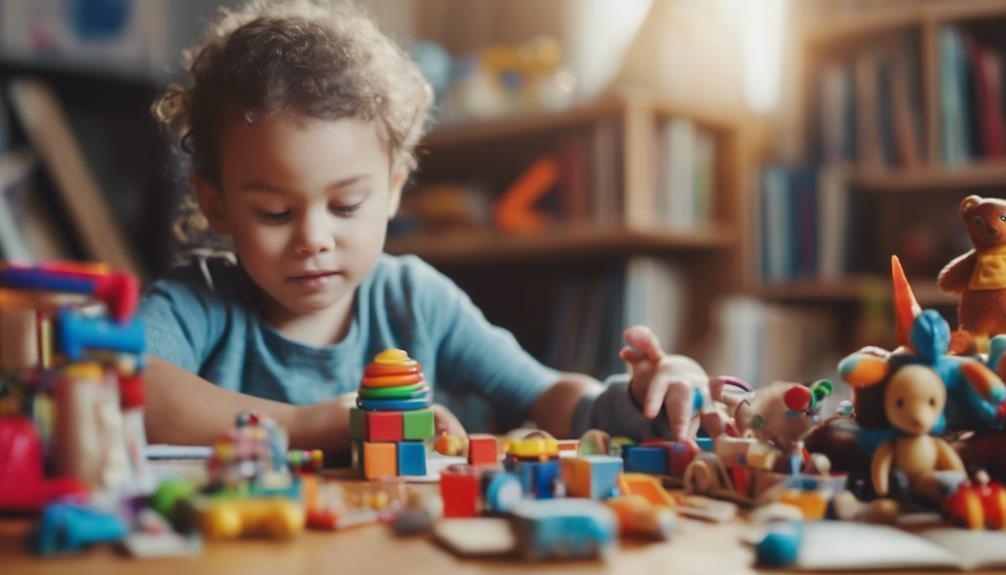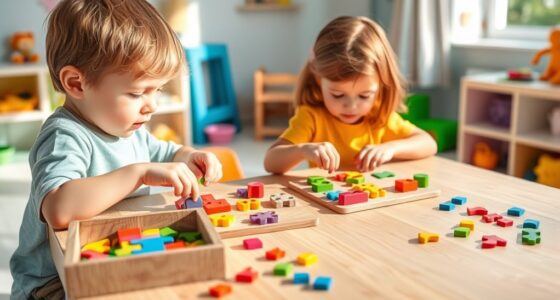Encouraging cognitive development in children is essential for enhancing their problem-solving skills and overall cognitive growth. Get involved in memory games, puzzles, and STEM activities to promote critical thinking. Engaging in art projects can help boost creativity and fine motor skills. Outdoor exploration can stimulate curiosity and cognitive abilities. Encourage problem-solving abilities through age-appropriate challenges. Routines and summarizing information can improve memory retention. Supporting analytical reasoning through puzzles and logical tasks is also beneficial. Pretend play can aid in cognitive flexibility. Foster a love for learning through hands-on experiences. Ensure healthy cognitive growth by providing proper nutrition and stable environments. Explore more ways to promote cognitive development in children.
Key Takeaways
- Engage in age-appropriate activities promoting problem-solving skills.
- Encourage exploration to develop critical thinking abilities.
- Provide opportunities for logical reasoning and decision-making.
- Support memory retention through interactive games and routines.
- Foster a love for learning through hands-on experiences and positive reinforcement.
Importance of Cognitive Development
Improving cognitive development in children is essential for nurturing critical thinking skills and laying a strong foundation for future academic success. Cognitive skills encompass a range of mental abilities, including problem-solving, critical thinking, pivotal reasoning, and understanding cognitive milestones.
By engaging children in activities that challenge their cognitive abilities, you're helping them develop the capacity to solve complex problems, retain information effectively, and analyze situations logically.
Understanding cause and effect relationships is a vital aspect of cognitive development, as it allows children to comprehend how different actions lead to specific outcomes. Encouraging cognitive milestones in children not only supports their overall cognitive growth but also equips them with the necessary tools to navigate the complexities of the world around them.
Enriching Activities for Children

Engage your child in fun learning games to boost creativity and problem-solving skills.
Encourage them to explore their artistic side through creative art projects, fostering imagination and self-expression.
Take them outdoors for exploration activities to enhance their sensory experiences and promote physical and cognitive development.
Fun Learning Games
Consider incorporating interactive activities like memory games, building blocks, storytelling, scavenger hunts, and STEM activities to make learning enjoyable and enriching for children.
Memory games such as 'Simon Says' or 'Memory Match' can enhance cognitive skills and attention span. Building blocks and puzzles promote problem-solving and spatial awareness.
Encouraging storytelling and role-playing fosters creativity, imagination, and language development. Scavenger hunts or treasure hunts improve observational skills and critical thinking.
Introducing STEM activities like simple experiments or building projects stimulates curiosity and logical reasoning. These fun learning games not only engage children but also help in their overall cognitive development.
Creative Art Projects
How can creative art projects benefit children's cognitive development? Engaging in various art activities like drawing, painting, and sculpting can greatly enhance your child's cognitive skills. These projects stimulate your child's imagination, fostering problem-solving abilities and encouraging them to express their emotions and thoughts. Through art, children learn to observe details, make decisions, and experiment with different materials, promoting critical thinking and decision-making skills. Additionally, creative art projects play an important role in developing fine motor skills, hand-eye coordination, and spatial awareness, all of which are essential for cognitive growth and academic success. By providing a platform for children to explore colors, shapes, and patterns, art activities also enhance visual-spatial skills and creativity, contributing positively to your child's cognitive development.
| Benefits of Creative Art Projects: | ||
|---|---|---|
| Problem-solving | Fine Motor Skills | Visual-Spatial Skills |
| Critical Thinking | Hand-Eye Coordination | Creativity |
| Decision-making | Spatial Awareness |
Outdoor Exploration Activities
Outdoor exploration activities, such as nature walks and scavenger hunts, can greatly enhance your child's cognitive development by stimulating their senses and fostering curiosity. Engaging in outdoor play not only promotes physical health but also aids in the development of problem-solving skills and critical thinking. Maneuvering natural obstacles during these activities encourages children to think creatively and enhances their spatial awareness.
Research indicates that compared to indoor activities, outdoor exploration can improve attention spans, creativity, and overall cognitive abilities in children. Exploring the natural environment provides valuable learning opportunities about animals, plants, and the ecosystem, contributing to knowledge acquisition and expanding cognitive horizons.
Exposure to natural settings during outdoor exploration also offers psychological benefits, such as stress reduction, mood improvement, and enhanced cognitive functions like memory and concentration in children. Encouraging your child to engage in outdoor exploration activities can play a significant role in achieving important cognitive milestones.
Cognitive Milestones by Age

As children grow, they achieve cognitive milestones at different ages, showcasing their developing abilities and skills. Stages of Cognitive Development are vital in understanding your child's progress.
Encouraging logical thinking and supporting developmental milestones can greatly aid your child's cognitive growth. At around 12 months, your child can follow simple directions, explore by banging objects, and put items in containers.
By 18 months, they show interest in pretend play and start following one-step directions. Around 2 years old, children can engage in pretend games, sort shapes and colors, and build towers with blocks.
At 3 years, puzzle-solving skills develop, along with the ability to match and sort objects. By the age of 4, children can use scissors, understand concepts of same and different, and follow multi-step instructions.
Engaging in activities that support these milestones will help your child develop essential cognitive skills.
Support for Problem-Solving Skills
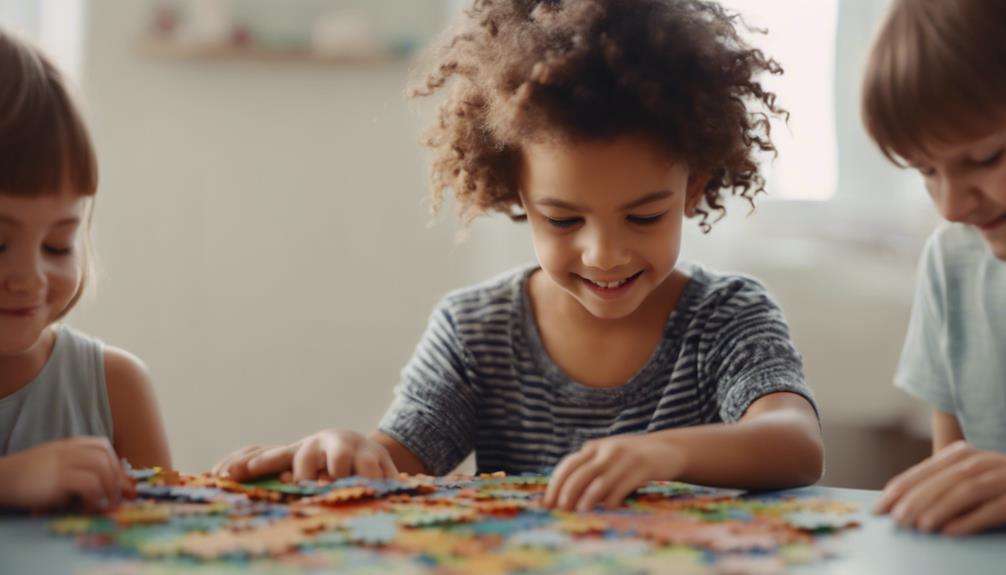
Encouraging the development of problem-solving skills in children is essential for their cognitive growth and overall development. By providing age-appropriate puzzles and challenges, you can support your child in honing their critical thinking abilities. Allow them opportunities to explore various solutions independently, fostering decision-making skills important for their cognitive milestones.
Open-ended activities that require evaluating outcomes and brainstorming solutions will further enhance their problem-solving capabilities.
It is important to assist children in identifying problems, guiding them through the process of finding solutions. By praising their effort and resilience in tackling challenges, you can instill a growth mindset that encourages continuous learning and improvement. This support for problem-solving skills not only aids in their immediate cognitive development but also equips them with valuable skills for future endeavors.
Memory Retention Strategies
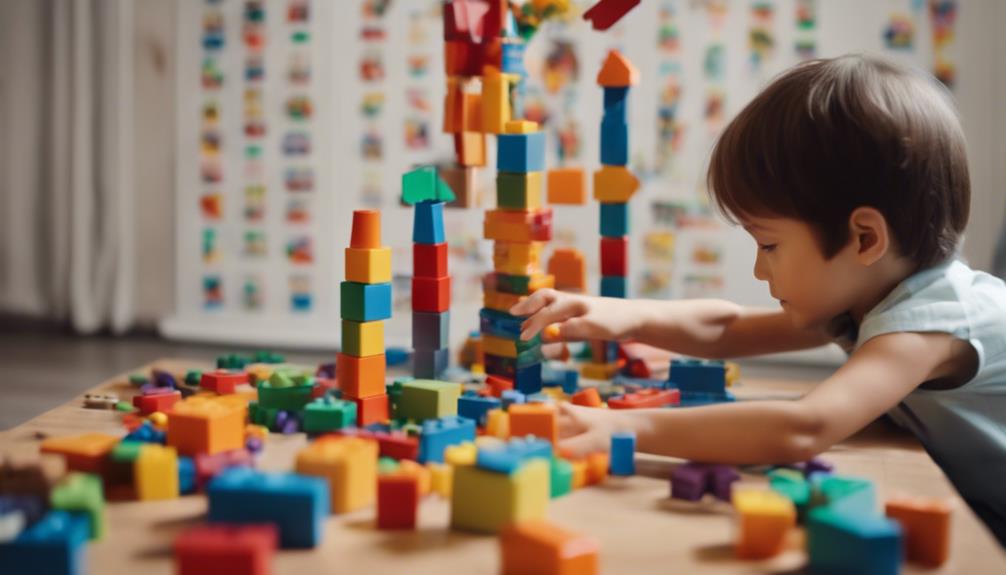
Utilizing various memory retention strategies can greatly enhance your child's ability to recall and retain information effectively. Engage your children in activities such as singing songs or reading stories, as these can greatly improve memory retention.
Encouraging them to participate in memory games or puzzles will also help enhance their memory skills. Visual aids like flashcards or picture books can be valuable tools in aiding children to retain information better by providing visual cues.
Establishing routines and incorporating repetition in learning processes can reinforce memory retention in children. Encourage your children to summarize information or teach others what they've learned, as this can further strengthen their memory retention.
Critical Thinking Enhancement
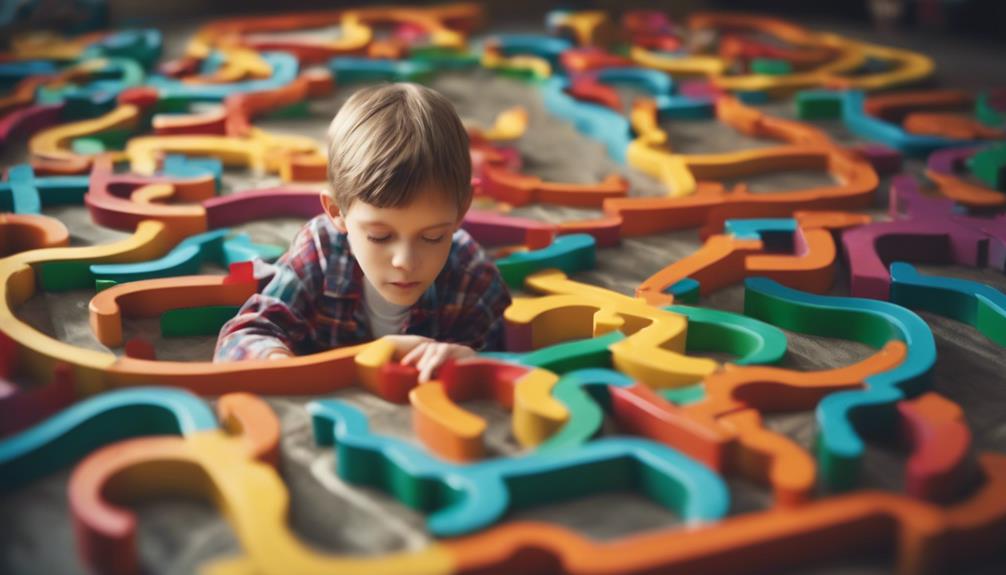
To enhance critical thinking in children, focus on problem-solving strategies that challenge their cognitive abilities.
Encourage analytical reasoning skills by engaging them in activities that require independent decision-making.
Problem-Solving Strategies
Engage children in interactive activities that stimulate critical thinking and enhance problem-solving skills. Encouraging kids to solve puzzles, riddles, and challenges promotes their ability to analyze situations, make logical decisions, and develop effective problem-solving strategies.
By providing open-ended tasks that require creative thinking and solution-finding, children can strengthen their critical thinking skills. Offering opportunities for logical reasoning and decision-making not only aids in problem-solving but also nurtures autonomy as children learn to make choices independently and consider the consequences of their actions.
Engaging children in discussions where they need to analyze information, evaluate options, and propose solutions further stimulates their critical thinking abilities. By incorporating these practices into their daily routine, children can develop a strong foundation in problem-solving, critical thinking, and decision-making that will benefit them throughout their lives.
Analytical Reasoning Skills
Enhancing children's critical thinking skills involves fostering their ability to analyze information and draw logical conclusions through engaging activities and thought-provoking challenges.
By encouraging problem-solving activities like puzzles and riddles, you can enhance their analytical reasoning skills. Engaging in activities that require logical thinking and decision-making stimulates cognitive development, while exploring cause-and-effect relationships helps develop critical thinking abilities.
Providing opportunities for children to foster curiosity through hands-on experiments and science projects is key to boosting their analytical reasoning skills. Encouraging them to ask questions, think critically, and draw logical conclusions strengthens their ability to analyze information effectively.
Fun and Educational Activities
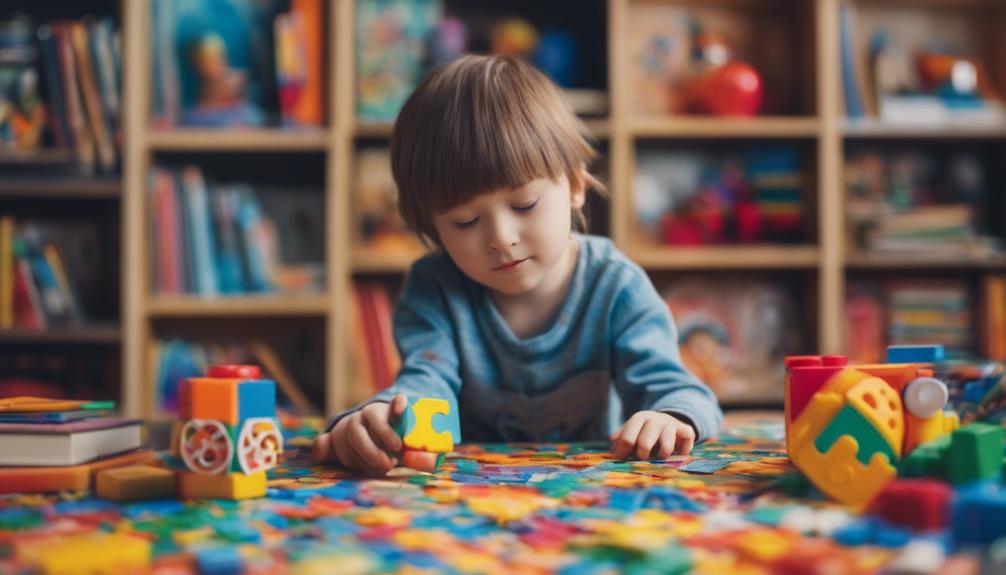
Encouraging children to participate in fun and educational activities can greatly enhance their cognitive development. Here are some engaging activities that can support various aspects of cognitive development:
- Engage children in pretend play to boost cognitive flexibility and problem-solving skills.
- Utilize memory games, puzzles, and matching activities to enhance working memory and problem-solving abilities.
- Incorporate educational games like sorting shapes, counting objects, and naming colors to strengthen cognitive skills.
Fostering Love for Learning

Creating an environment that nurtures a genuine love for learning in children is essential for their long-term academic success and personal growth. By engaging young children in hands-on activities and encouraging them to explore the world around them, you can foster a positive attitude towards learning. Offering a variety of experiences, such as reading, puzzles, and experiments, helps spark interest and develop essential skills for cognitive development.
To help you understand the importance of fostering a love for learning, let's explore the table below:
| Benefits of Fostering Love for Learning |
|---|
| Leads to lifelong curiosity and thirst for knowledge |
| Fosters a positive attitude towards learning |
| Supports cognitive development and skill-building |
| Encourages young children to explore the world |
| Enhances overall child development |
Promoting Healthy Cognitive Growth
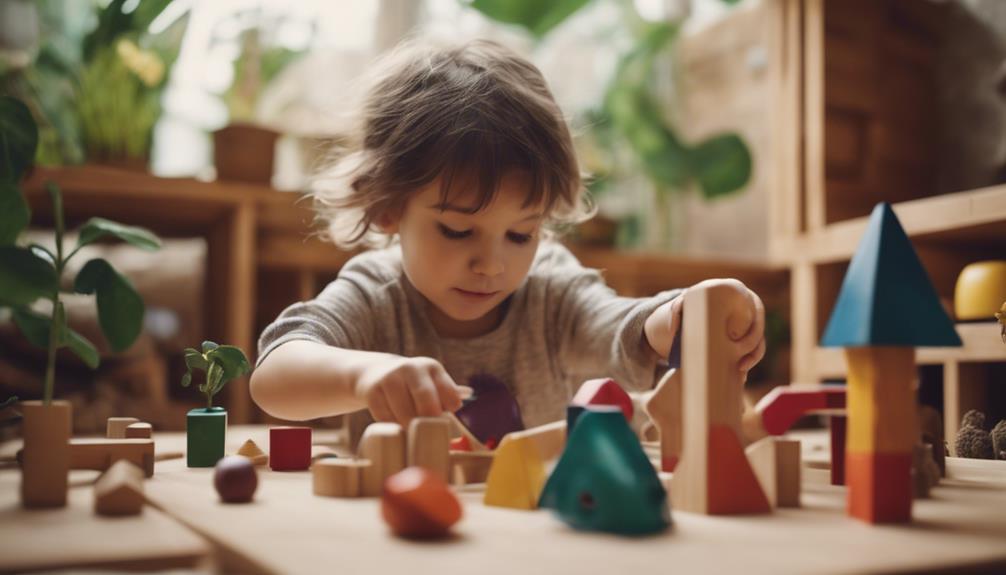
To support healthy cognitive growth in children, ensuring they get enough sleep and proper nutrition is essential for ideal brain development. Adequate sleep and hydration are critical for cognitive function, supporting the best brain development.
Proper nutrition, including iodine, iron, folate, zinc, vitamin B12, and omega-3, plays a significant role in supporting cognitive functions. Stability in the environment is crucial for cognitive growth, providing a secure foundation for learning and development.
- Adequate Sleep: Critical for cognitive function and best brain development.
- Proper Nutrition: Essential nutrients like iodine, iron, folate, zinc, vitamin B12, and omega-3 support cognitive functions.
- Stable Environment: Crucial for providing a secure foundation for learning and development.
Frequently Asked Questions
How Do You Promote a Child's Cognitive Development?
To promote a child's cognitive development, engage in various activities like singing, asking questions, and playing make-believe. Encourage exploration through puzzles and building blocks. Provide memory practice with games like matching and storytelling.
What 3 Factors Can Strengthen a Child's Cognitive Development?
You've got this! Positive interactions, challenging activities, and a rich environment are key. Keep engaging in problem-solving, critical thinking, and memory games. Your cognitive skills will thrive with these factors in play.
Which Activity Would Best Promote Cognitive Development for a Child?
To best promote cognitive development for a child, engage in a variety of activities like pretend play, completing puzzles and mazes, interactive computer games, and memory games. Mix it up to challenge different skills!
How Can Educators Support Children's Cognitive Development?
Hey there, to help kids grow smarter, engage their senses with hands-on activities. Encourage questions, diverse perspectives, and creative play. Boost memory with games. Stimulate problem-solving, critical thinking, cognitive flexibility, and language skills.
Conclusion
As you continue to engage your child in enriching activities and support their problem-solving skills, you're setting the stage for healthy cognitive growth.
By fostering a love for learning and providing opportunities for critical thinking, you're helping them reach important cognitive milestones.
Remember, every small step forward in memory retention and critical thinking is a building block towards a bright future filled with endless possibilities.
Keep up the great work in nurturing your child's cognitive development!

